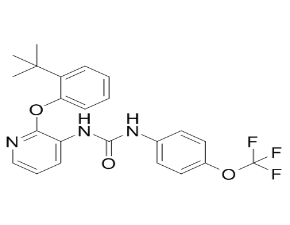
BPTU
CAS No. 870544-59-5
BPTU( BPTU | BMS-646786 | BMS 646786 )
Catalog No. M17632 CAS No. 870544-59-5
Allosteric antagonist of P2Y1 (EC50 = 0.06-0.3 μM). Non-nucleotide ligand. Binds receptor outside of the helical bundle.
Purity : >98% (HPLC)
 COA
COA
 Datasheet
Datasheet
 HNMR
HNMR
 HPLC
HPLC
 MSDS
MSDS
 Handing Instructions
Handing Instructions
| Size | Price / USD | Stock | Quantity |
| 2MG | 41 | In Stock |


|
| 5MG | 59 | In Stock |


|
| 10MG | 106 | In Stock |


|
| 25MG | 226 | In Stock |


|
| 50MG | 390 | In Stock |


|
| 100MG | 578 | In Stock |


|
| 200MG | Get Quote | In Stock |


|
| 500MG | Get Quote | In Stock |


|
| 1G | Get Quote | In Stock |


|
Biological Information
-
Product NameBPTU
-
NoteResearch use only, not for human use.
-
Brief DescriptionAllosteric antagonist of P2Y1 (EC50 = 0.06-0.3 μM). Non-nucleotide ligand. Binds receptor outside of the helical bundle.
-
DescriptionAllosteric antagonist of P2Y1 (EC50 = 0.06-0.3 μM). Non-nucleotide ligand. Binds receptor outside of the helical bundle. Blocks inhibition of spontaneous contraction of rat and mouse colon induced by electrical field stimulation, nicotine and P2Y agonists. Antithrombotic; reduces platelet aggregation.
-
In VitroBPTU blocks the supramaximal fast inhibitory junction potentials (fIJP) in a concentration-dependent manner both in the rat and mouse colon. The EC50 of BPTU is approximately 0.3 μM and 0.06 μM for the rat and mouse colon, respectively. In the rat colon, addition of the P2Y agonist ADPβS at 10 μM significantly reduces spontaneous contractions to a 43.2±13.4% (N=5) (P=0.0002), and this reduction is blocked by 15 min incubation with BPTU at a concentration of 3 μM (93.3±5.1%). Similar results are obtained in the murine colon where ADPβS at 10 μM reduces the area under the curve (AUC) of contractions to a 15.8±5.1% (N=4) (P<0.0001) and its effect is reversed with BPTU at 3 μM (82.7±3.6%). Addition of MRS2365, a selective P2Y1 agonist, at a concentration of 5 μM significantly reduces spontaneous contractions to a 21.2±4.8% (N=5) (P=0.0002) in the murine colon, and this reduction is blocked by 15 min incubation with BPTU at a concentration of 3 μM (93.1±3.8%). The blockage of the MRS2365-induced response by BPTU at 3 μM also occurs in control conditions (N=5) (10.2±5.5% vs. 86.7±5.0%).
-
In VivoUptake of BPTU from the peritoneal cavity is relatively rapid. Blood boron levels are maximal within 1 h after administration. After only 1 h, a boron tumor-to-blood ratio above 1 is found for BPTU in pigmented tumors, which is indicative of drug retention. This is not seen in the non-pigmented tumor variant, in which tumor boron levels closely follow blood levels. Up to 24 h, Borocaptate sodium (BSH) exhibits no selective retention in either tumor, but achieves higher maximum tumor boron concentrations than BPTU as a result of the administration of higher amounts of boron. During the tissue distribution phase, liver-to-kidney boron concentration ratios range from 2 to 4 for BSH and from 0.5 to 1 for BPTU.
-
SynonymsBPTU | BMS-646786 | BMS 646786
-
PathwayOthers
-
TargetOther Targets
-
RecptorP2Y1
-
Research AreaCardiovascular Disease
-
Indication——
Chemical Information
-
CAS Number870544-59-5
-
Formula Weight445.42
-
Molecular FormulaC23H22F3N3O3
-
Purity>98% (HPLC)
-
SolubilityDMSO : ≥ 33.3 mg/mL. 74.76 mM; H2O : < 0.1 mg/mL
-
SMILESCC(C)(C)C1=CC=CC=C1OC2=C(C=CC=N2)NC(=O)NC3=CC=C(C=C3)OC(F)(F)F
-
Chemical Name1-[2-(2-tert-Butylphenoxy)pyridin-3-yl]-3-[4-(trifluoromethoxy)phenyl]urea
Shipping & Storage Information
-
Storage(-20℃)
-
ShippingWith Ice Pack
-
Stability≥ 2 years
Reference
1.Abrahamsen B, et al. J Neurosci. 2013 Jan 16;33(3):1068-87.
molnova catalog



related products
-
Curcumenol
Curcumenol, one of the major components of Zedoary turmeric oil, is an antibiotic drug which has anti-Y, anti-inflammation activity.
-
PF-05231023
PF-05231023 is a long-acting fibroblast growth factor 21 (FGF21) analog and is an FGF21-receptor agonist. It is also suitable for development as a potential treatment for T2DM. PF-05231023 is a analog of long-acting fibroblast growth factor 21.
-
Isorhamnetin-3-O-glu...
Isorhamnetin-3-O-glucoside? inhibits the activity of alpha-glucosidase from rat intestine.



 Cart
Cart
 sales@molnova.com
sales@molnova.com


